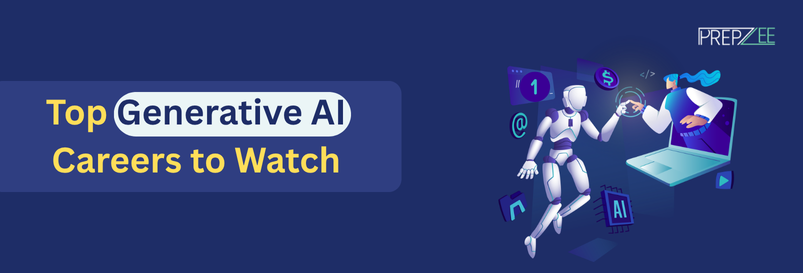Top Generative AI Careers to Watch in 2025


Table of content
The landscape of technology is constantly evolving, and at the forefront of this transformation is the burgeoning field of Generative AI. As artificial intelligence continues its rapid advancement, new and exciting AI jobs are emerging, offering lucrative and impactful career paths for skilled professionals. This article delves into the top Generative AI careers to watch in 2025, exploring the skills required, the growth potential, and why now is the perfect time to explore artificial intelligence future jobs.
We will also touch upon the crucial role of AI ML training courses in preparing individuals for these in-demand roles. The intersection of artificial intelligence and machine learning is creating unprecedented opportunities, and understanding these career options is essential for navigating the future job market.
What Is Artificial Intelligence and Machine Learning?
To understand the exciting career paths in Generative AI, it’s crucial to first define the foundational concepts of Artificial Intelligence (AI) and Machine Learning (ML). Artificial Intelligence, in its broadest sense, refers to the ability of machines to perform tasks that typically require human intelligence, such as learning, problem-solving, decision-making, and perception. Machine Learning is a subset of AI that focuses on enabling systems to learn from data without being explicitly programmed.
Through algorithms that can identify patterns and make predictions, ML powers many of the AI applications we see today. The AI ML market is heavily reliant on professionals who possess a strong understanding of both AI and ML principles. Furthermore, AI ML training courses provide the necessary theoretical and practical knowledge to excel in artificial intelligence future jobs. The development of sophisticated AI, including Generative AI, is a key driver of the increasing jobs. Exploring career options requires a solid grasp of these fundamental concepts.
Generative AI, a particularly innovative area within AI and ML, focuses on creating new, original data instances that resemble the training data. This includes generating text, images, audio, video, and even code. The power of Generative AI is transforming various industries, from content creation and entertainment to drug discovery and materials science, leading to a surge in demand for specialized skills and the creation of novel AI jobs.
Mastering the techniques behind Generative AI, often taught in advanced training courses, is becoming increasingly valuable for those seeking artificial intelligence future jobs. The unique capabilities of Generative AI are significantly contributing to the growth of artificial intelligence and machine learning. Understanding the nuances of Generative AI is a key aspect of exploring modern career options.
Growth and Demand for AI and ML Jobs
The growth and demand for AI ML jobs are nothing short of explosive. As businesses across all sectors recognize the transformative potential of AI and ML, the need for skilled professionals who can develop, implement, and manage these technologies continues to skyrocket. Reports consistently highlight the significant increase in job postings related to jobs, indicating a robust and expanding job market. This demand is fueled by the increasing adoption of AI-powered solutions for automation, personalization, and innovation.
The AI jobs of the future are being created at an unprecedented rate, driven by advancements in areas like Generative AI, natural language processing, and computer vision. Investing in training courses is a strategic move to capitalize on this burgeoning demand for future jobs. The sheer volume of jobs available underscores the importance of exploring career options in artificial intelligence now.
The rise of Generative AI is further amplifying this demand. The ability of machines to create novel content has opened up entirely new possibilities and requires a specialized skill set. Professionals who understand the intricacies of Generative AI models, their training, and their deployment are highly sought after, contributing to the exciting landscape of future jobs.
Companies are actively seeking individuals with expertise in this cutting-edge field, leading to competitive salaries and numerous career options. AI ML training courses that focus on Generative AI are becoming increasingly popular as individuals aim to position themselves at the forefront of this technological wave. The impact of Generative AI on various industries ensures that AI ML related to this domain will continue to be in high demand.
Key Trends in AI and ML
Several key trends are shaping the landscape of AI ML and influencing the skills that will be most valuable in 2025 and beyond. Understanding these trends is crucial for those planning their careers and choosing relevant training courses. One significant trend is the increasing focus on ethical and responsible AI development. As AI systems become more integrated into our lives, ensuring fairness, transparency, and accountability is paramount, leading to a growing demand for professionals with expertise in AI ethics and governance, a crucial aspect of many future jobs.
Another key trend is the democratization of AI tools and platforms, making AI development more accessible to a wider range of professionals. However, this also increases the need for experts who can effectively leverage and customize these tools, a skill often honed in specialized training courses. The artificial intelligence and machine learning market is also seeing a greater emphasis on edge AI, bringing computation and data storage closer to the source of data, requiring expertise in deploying AI models on resource-constrained devices.
The rapid advancements in Generative AI are themselves a major trend. The development of more sophisticated models capable of generating increasingly realistic and complex data is driving innovation across industries and creating new categories of AI jobs of the future. This includes roles focused on prompt engineering, model fine-tuning, and the application of Generative AI in specific domains.
AI ML training courses are adapting to include specialized modules on Generative AI techniques and applications. The convergence of AI with other emerging technologies, such as the Internet of Things (IoT) and blockchain, is also creating novel artificial intelligence and machine learning that require interdisciplinary skills. Staying abreast of these key trends is vital for navigating the evolving career options.
Job Opportunities and Skills Needed
The artificial intelligence and machine learning market offers a diverse range of opportunities, each requiring a specific set of skills. As we look towards 2025, several roles within the realm of Generative AI are particularly promising. To seize these career options in artificial intelligence, individuals need to acquire the necessary technical and soft skills, often through dedicated training courses. Strong programming skills in languages like Python, proficiency in machine learning frameworks such as TensorFlow and PyTorch, and a solid understanding of statistical modeling and deep learning are fundamental for many AI jobs of the future.
Additionally, expertise in data preprocessing, feature engineering, and model evaluation is crucial. For roles specifically in Generative AI, skills in areas like natural language processing (NLP), computer vision, and generative modeling techniques (GANs, VAEs, diffusion models) are highly valued. Beyond technical skills, soft skills such as problem-solving, critical thinking, communication, and collaboration are also essential for success in AI ML jobs. The ability to understand business needs and translate them into AI solutions, as well as effectively communicate complex technical concepts to non-technical stakeholders, is increasingly important.
AI ML training courses are beginning to incorporate aspects of these soft skills alongside the technical curriculum. The artificial intelligence and machine learning jobs landscape demands professionals who are not only technically proficient, but also adaptable and able to work effectively in multidisciplinary teams. Exploring career options in artificial intelligence requires a holistic approach to skill development, encompassing both technical expertise and essential soft skills.
List of Top AI and ML Jobs in 2025
Based on current trends and the increasing prominence of Generative AI, here is a list of top AI ML jobs to watch in 2025, representing exciting career options:
- Generative AI Scientist/Engineer: This role focuses on researching, developing, and deploying new Generative AI models for various applications, such as content creation, synthetic data generation, and novel design. Expertise in deep learning, generative modeling techniques (GANs, VAEs, diffusion models), and programming is crucial. Advanced training courses are essential for this role.
- Prompt Engineer: A rapidly emerging role focused on crafting effective prompts for large language models (LLMs) and other Generative AI systems to achieve desired outputs. This requires a blend of technical understanding and creative thinking. Specialized training courses are starting to address this specific skill set.
- AI Ethics and Governance Specialist: With the increasing focus on responsible AI, this role involves developing and implementing ethical guidelines and governance frameworks for AI systems, ensuring fairness, transparency, and accountability. A background in computer science, ethics, or law is often beneficial.
- Machine Learning Operations (MLOps) Engineer: This role focuses on streamlining the deployment, monitoring, and management of ML models in production. Expertise in DevOps practices, cloud platforms, and ML frameworks is essential. Training courses with a focus on deployment and scaling are highly relevant.
- AI Product Manager: This role involves defining the vision, strategy, and roadmap for AI-powered products. A strong understanding of both AI/ML technologies and business needs is crucial.
- Computer Vision Engineer: With applications ranging from autonomous vehicles to medical imaging, computer vision engineers develop AI systems that can “see” and interpret images and videos. Expertise in deep learning, image processing, and relevant frameworks is required.
- Natural Language Processing (NLP) Engineer: This role focuses on developing AI systems that can understand and process human language, powering applications like chatbots, language translation, and sentiment analysis. Strong skills in linguistics and deep learning are necessary.
- AI Research Scientist: This role involves conducting fundamental research in AI and ML, pushing the boundaries of the field and developing new algorithms and techniques. A strong academic background and research experience are typically required.
- AI Solutions Architect: This role designs and architects end-to-end AI solutions for businesses, integrating various AI and data services. A broad understanding of the AI landscape and cloud platforms is essential.
- AI-Powered Robotics Engineer: Combining AI with robotics, this role involves developing intelligent robots capable of perception, decision-making, and interaction with their environment.
These AI jobs of the future highlight the diverse career options in artificial intelligence available in 2025. Investing in relevant training courses and developing the necessary skills will be key to capitalizing on these exciting opportunities. The growth of artificial intelligence and machine learning jobs shows no signs of slowing down, making this a promising field for career development.
Opportunities in Artificial Intelligence
The opportunities in artificial intelligence extend far beyond specific job titles. The transformative power of AI is creating new industries, reshaping existing ones, and offering solutions to some of the world’s most pressing challenges. From revolutionizing healthcare with AI-powered diagnostics and drug discovery to creating more sustainable and efficient energy systems, the potential of AI is immense. This broad impact translates into a wealth of future jobs across various sectors. The demand for professionals who can harness the power of AI, particularly Generative AI, to drive innovation and solve complex problems will continue to grow exponentially. Training courses are the gateway to unlocking these vast opportunities.
For individuals looking to enter or advance their careers in this dynamic field, the opportunities are plentiful. The relatively nascent stage of many Generative AI applications means there is significant room for innovation and the creation of entirely new roles that we cannot even imagine today. Continuous learning and adaptation are crucial for staying ahead in this rapidly evolving landscape.
Engaging with the AI research community, exploring new tools and techniques, and pursuing ongoing training courses will be essential for seizing the future jobs. The artificial intelligence are constantly expanding, offering exciting and impactful paths for those with the right skills and a passion for innovation. The future of work will be deeply intertwined with AI, making the opportunities a compelling area for career exploration and development.







